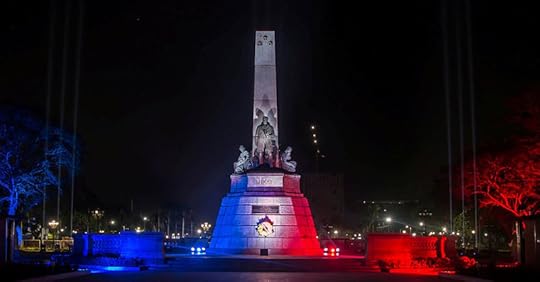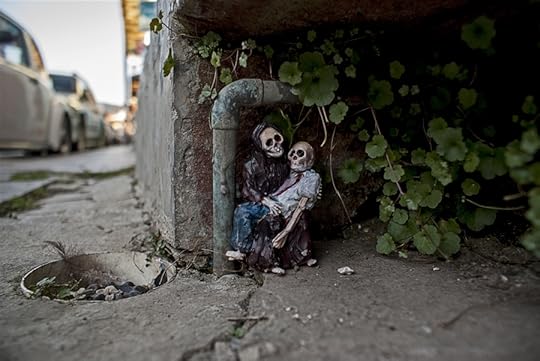Jim Pascual Agustin's Blog, page 11
April 28, 2020
The Oddest Angels gets a write up
GMA News Online picked up a poem I wrote. Leave a comment on the website to let them know there are readers who appreciate poetry. Maybe share with your friends.
April 14, 2020
Isa pang tugon sa pag-iingay ng DDS
Paghahati sa Iniluwal na Kaban ng Bayan
“Araw-araw, binibilang ang mga nabubuwal…
Sa gutom ay natatakot yaong nag-aagawan,
Kinakalas na ang batas, pumapalag kung masúkol. ”
– “Luwalhati” ni Rebecca T. Añonuevo
Maiging maunawaan na hindi mahika
ang agham. Lohika ang wika nito,
batay sa masusing pagmamasid, paghahanap
ng mga kaugnayang madalas hindi inaasahan.
May sukat na limitado ng panukat,
may panghuhula, ngunit may materyal na
kinahahabian, tila sapot na kay dali ring mapigtal
kung mapapatunayang may ibang posibleng paliwanag.
Kaya dating makatang bula na ngayon
ang lohika, bakit mo tinutuya na tila kakilala
ang Kamatayan? Sa ibang panahon, mapapalampas
sana ito, parang ingay sa perya na naghahatid
ng panandaliang paglimot sa pang-araw-araw na pagod.
Maaari mo pang mala-Hamlet na hawakan
ang bungo ng kung-sinong estranghero,
magyayakyak ka’t magtitili hanggang umusbong
ang lahat ng litid mula leeg hanggang kilikili.
Ngunit sa ilalim ng kasalukuyang rehimen
na iyong sinasamba, katawa-tawa.
Hindi tawang may tuwa,
kundi matinding kapaitan.
Gamitan mo kaya ng agham ang pagbibilang
sa iniluwal na kaban ng bayan?
Hanapan mo kaya ng mga materyal na patunay
ang landas na tinahak ng bawat piso
sa bilyon-bilyong ipinagkatiwala sa tuliro-
kung-magsalita mong poon?
“Tahimik ngayon ang paligid, ngunit di lubhang tahimik,”
ang wika mo. Ang tugon dapat ng Kamatayan,
mula rin sa iyong salita: “Traydor ka
mula’t mula, hindi patas kung lumaban.”
-o-
Posted by Rebecca T. Añonuevo on Friday, April 10, 2020
April 7, 2020
Diyan Mismo sa Flag

Diyan Mismo sa Flag
“Magkikita na lang tayo diyan sa Rizal Park.
Diyan mismo sa flag ni Rizal magbigti na lang ako.”
– Rodrigo Roa Duterte, 6 Abril 2020
May bunganga ang basurahan. May bunganga
ang imburnal, ang inidoro, ang halimaw na gabi lamang
kung mag-iingay. Samantala, nais magpahinga
ang mga may kaluluwa at pagod ang katawan.
Ngunit kaya nga halimaw ang tawag sa halimaw.
Nanghahalina, nais mangibabaw sa paraang kanyang-kanya.
Maging ang bandila ng bayani na malaon nang yumao,
gagawing pambigti. Akala mo may kakawalang kaluluwa
sa kanyang kalamnang pumipintig lamang
habang nagpapakahayok at nagpapasasa
sa karimlang kinasalampakan.
Kung maaari lang, kumilos sana
ang estatwa ni Pepe,
sipain ka sa bayag.
Ngunit wala ka, eh.
Ay heyt drags.
-o-
Apologies for those who cannot read Filipino. I’ll try to work on a translation when I get a chance.
March 31, 2020
Dust and silence
How does one celebrate a birth many years ago when today thousands are dying? You can say it has always been like that. A birth, a thousand or more deaths, all in one moment.
So it is my birthday today and the world seems to be on a wobbly spin – most friends and family I know are staying indoors if they can. Distances made more real.
Then again, it is maybe just us humans. All other creatures go on as they always have, surviving however they can without claiming more than the ground or sky where their bodies are at each moment.
Perspective. A way of looking at things.
So I am thankful for another year around the sun that cares not if I take another breath or my last. Thankful for the words and the silences. For all that I’ve lived through, seen, felt, and been entangled with, that somehow have not brought me to surrender whatever beats inside.
One day all of us may seem like nothing more than dust and silence. A comfort and a challenge.
[image error]
[image error]
December 29, 2019
Crocodiles in Belfast & other poems out on Amazon Kindle
My incredible publisher, San Anselmo Press, has released my new book of poetry on Amazon Kindle. The print edition is due to follow.
I’m uneasy about telling readers what I try to achieve in a particular work. I can only hope that readers will find something that will resonate with them, something that may unsettle them.
Please consider buying the book or giving it to someone who appreciates poetry.
The price of this Kindle edition varies slightly depending on your location, it seems.
November 29, 2019
New poem appears on Teesta Review
A new poem about destiny appears on Teesta Review.
I have always found it an interesting challenge to try and write in response to a prompt – a photo, a work of art, or even just a word. It is one way of looking at something outside of your usual line of vision, a turning away so that you may see things differently.
Thank you to guest editor and great poet Raphael d’Abdon.
[image error]Who needs shoes?
November 25, 2019
Recognition or Oblivion
[image error]
Recognition or Oblivion
I wish to congratulate my good friend,
Joel H. Vega, whose book, Drift, was awarded the Philippine
National Book Award for Poetry in English for 2019. My own book, How
to Make a Salagubang Helicopter & other poems, was the
co-finalist.
In previous years two other books of
mine were recognized as finalists by the National Book Development
Board: Baha-bahagdang Karupukan (poetry in Filipino) and Sanga
sa Basang Lupa at iba pang kuwento (short stories in Filipino).
There are many books published every
year in the Philippines. I’m grateful that the NBDB has seen my
work worthy of being noticed multiple times.
I think it is an interesting exercise,
these awards. They aim to spread literacy and book appreciation. They
could be seen as stepping stones to bigger things. More book deals
for the author, maybe an increase in sales.
But in a way, these awards could be
misleading. They could also act as a type of gatekeeping. Will those
books that never got noticed by the gatekeepers be “forgotten” or
will the readers who admire such books make certain they are not left
out, that they are actually read and appreciated.
Who chooses – who are these
gatekeepers – and what is the process of their selection? More so,
if funds spent on these awards are public funds, surely the public –
perhaps as represented by librarians in schools and universities –
should have some say?
I am posing these questions after
having read how the National Book Awards in the US is conducted.
https://www.nationalbook.org/national-book-awards/how-works/
At the same time, I am not totally
ignorant of the absence of libraries in public places in the
Philippines. The biggest libraries are in exclusive universities –
for the children of the elite – and in some properly functioning
public universities. There is no actual nationwide library system.
Public education has made sure of a highly literate, though
impoverished, population. This literacy has been useful in getting
employment locally through call centers in the cities and through
many positions of service outside the country.
I grew up speaking Filipino. English
is not my mother tongue. My mother and father grew up speaking
Ilocano and Tagalog/Filipino, and perhaps one other local language.
English came to me through public school and Sesame Street. Books
came much later, years after I consumed local comic books from a
stand in a wet market on the walk back home of a good few kilometers.
In my youth, I had no experience of
what it’s like reading books that weren’t required at school. The
so-called library at the public school I went to had stuffed animals
instead of real books.
I would like to be surprised by being
told that the situation is much different now compared to decades
ago, that there is now a public library at every barangay.
The first library I entered and was
able to use was in a Jesuit-run high school. I was lucky enough to
receive a financial scholarship through the singular efforts and
kindness of an Irish American, the late Fr. James O’Brien. He also
shared his love of learning to hundreds of young, less privileged
students like me. He taught us English through stories and poetry,
while making clear that it was to be used so we could stand up for
ourselves among those who considered the local languages inferior. He
spoke excellent Filipino and Bicolano.
That library – and later the
university library and the British Council library in Manila –
became a kind of refuge for me. They felt more holy than all the
churches and chapels that dotted the country.
So where to start with spreading a
wider appreciation of books in the Philippines? I’m not saying
ditch these awards. They are one way, though perhaps quite flawed, of
leading possible readers to discover an author or a book.
In order to truly expand the
appreciation of books, there would have to be a healthy reading
public. You cannot force people to read, but you should provide them
with libraries where they can experience for themselves the joys of
reading.
The National Book Development Board,
with the help of the Department of Education, should work towards
building a national public library network. These libraries could be
initially stocked with the literary output of Filipino authors
published by established publishers as well as by smaller independent
publishers, even brave authors who self-publish work that might not
seem “easily marketable” by a publishing house. They should fill
these libraries with books in as many Philippine languages as
possible. Translations of international work to the local languages
should be encouraged and funded. After that, instead of spending
public funds, they should welcome donations of international titles.
What then of the existing structures
for these awards? I’m an outsider, to be honest. Always have been.
Perhaps I’m a little sore that my work has only been partly
recognized again by the gatekeepers.
A few years back I released a poetry
book – Alien to Any Skin (UST Publishing House, 2011) –
alongside the shortlisted Baha-bahagdang Karupukan. I was
deeply disappointed that Alien to Any Skin was not even
shortlisted, though thankful that the other book was. It was a very
special paper child, Alien, if I may say so. There, I’ve
said it now.
How to Make a Salagubang Helicopter
& other poems is an altogether different book, but no less
special. It is a book that demands a readership and recognition now,
not just because of the poetry, but also because of the pertinent
issues it challenges the reader to face: bullying, violence, and,
more particularly, the deadly consequences of the fake war on drugs
by the Duterte regime. It also contains poems that have little to do
with such issues, and more about a search for a common humanity.
These days the Philippines is ground
zero for social media misinformation. The basic literacy that
Filipinos received through the public school system is what has made
them vulnerable to the lies that the current regime uses to block
legitimate criticism.
I hope that my book won’t be left in
the halls of oblivion. I want it to one day be read, sooner rather
than later, by more critical thinking readers.
How to Make a Salagubang Helicopter
& other poems is widely available in both independent and
chain book stores in the Philippines or through the Facebook page or
website of San Anselmo Publications. A Kindle edition is also
available on Amazon.
October 1, 2019
Outsider Looking In
My latest paper child got the attention of some readers who turned out to be part of an institution that’s meant to give recognition to published books in the Philippines.
It’s a bonus. Anything else after being read is a bonus, if it means a chance to be read by even more readers.
I’ll keep my thoughts to myself for now about award giving bodies. Previous books of mine got citations but didn’t win in this same one. Let’s see how things turn out this time.
For now, thank you to my publisher, the brave San Anselmo Publications, for trusting in my work. Thank you to those who have read or bought (or both! even better) How to Make a Salagubang Helicopter & other poems. Congratulations to long-time friend, fellow finalist Joel H. Vega!
August 7, 2019
Wikang Buwaya
Wikang Buwaya
tugon sa “Gahasa sa Gahasa” ni Rebecca T. Añonuevo
Sa ilalim ng tulay, nakakubling kapiling
ang mga lumot na madulas na umiindayog
sa lilim, may tahimik na naghihintay.
Tila tuod na nabuwal ng ulol na bagyo
mula sa Timog, hindi siya matinag
sa lublob na kinalalagyan. Hanggang
isang araw may mamataang nilalang
na maaaring mapagbuntunan ng naisaloob
na karahasan. Tatalas ang mga mata, iigkas
ang maiikli ngunit matipunong mga biyas
at lalantad sa isang iglap ang kinang-sa-laway
na mga pangil. Sagpang, papilipit na patuwad-
balibag-hataw-pagpapalag sa tubig
na mag-aalimbukay sa lumot at putik.
Hindi pakakawalan ang duguang katawan
kahit pa man magsigawan ang mga gimbal
na saksi. Walang silbi ang ipinukol nilang mga buhay
na bato. May sariling wika ang mga buwaya.
-o-
August 2, 2019
Art and Murder
I chanced upon this page from This is Collossal that made me remember what’s been happening among the largely poor population in the Philippines.




